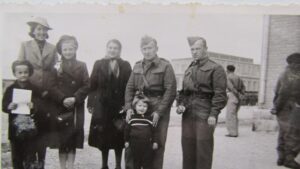
Renata Iwanowska (standing beside a soldier) with her mother and soldiers of the Polish Armed Forces in the West, Tehran 1942. From the Sybir Memorial Museum collection.
“We marched through the streets of Pahlevi, not yet realising the complete change in our fate. We were no longer threatened by anything: the NKVD and the Soviet authorities could no longer do anything to us. We were so tired, dirty, hungry, thirsty, and exhausted that we could not appreciate the positive consequences of what was happening to us. We won life. We did. But what happens to those left behind, on the other side of the salty Caspian Sea? Will they manage to escape the fate awaiting them in the next God-knows-how-many years under Soviet conditions?” On 24 March 1942, the first stage of the evacuation from the Soviet Union to Iran of the soldiers serving in the so-called Anders’ Army began. Within 2 weeks, more than 33,000 soldiers and almost 11,000 civilians reached the port of Pahlevi (now Bandar-e Anzali in Iran) via the Caspian Sea. Other groups made the journey in the following months. In total, some 78,000 deportees who had joined the Polish army and 37,000 civilians, including some 18,000 Polish children, were evacuated. Their subsequent fate was complicated and many did not survive the war, but at that moment they were given a chance – “they won their lives”, as Edward Pieńkos stated in his memoirs, quoted above.



